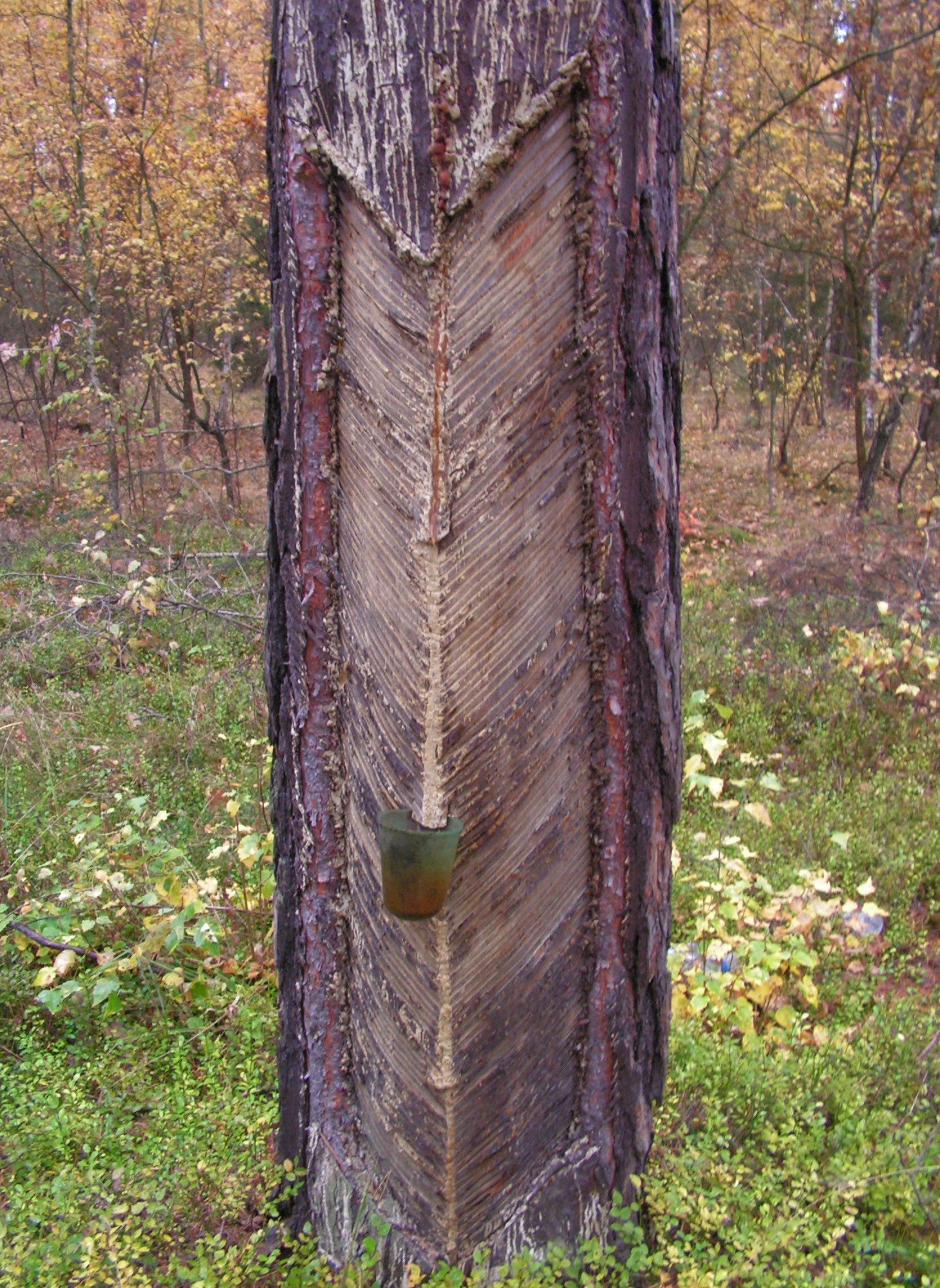Resin worker on:
[Wikipedia]
[Google]
[Amazon]

 Resin workers were people whose work involved the extraction or working of
Resin workers were people whose work involved the extraction or working of
Harzer
/ref> and Pechhacker ("resin cutter").

 Resin workers were people whose work involved the extraction or working of
Resin workers were people whose work involved the extraction or working of resin
In polymer chemistry and materials science, resin is a solid or highly viscous substance of plant or synthetic origin that is typically convertible into polymers. Resins are usually mixtures of organic compounds. This article focuses on natu ...
, which was needed as a raw material in the manufacture of pitch, tar
Tar is a dark brown or black viscous liquid of hydrocarbons and free carbon, obtained from a wide variety of organic materials through destructive distillation. Tar can be produced from coal, wood, petroleum, or peat. "a dark brown or black bi ...
and turpentine
Turpentine (which is also called spirit of turpentine, oil of turpentine, terebenthene, terebinthine and (colloquially) turps) is a fluid obtained by the distillation of resin harvested from living trees, mainly pines. Mainly used as a spec ...
. Resin work was an occupation that largely died out in the 19th and 20th centuries, but it was sometimes a primary occupation as well as a secondary source of income.
Terminology
As well as the general term "resin worker", the terms resin burner and resin picker are also used in the literature.France
In France, where the occupation was common, a resin picker was a ''gemmeur'', whilst a resin worker was a ''résinier''.Germany
In German-speaking lands, the general term was ''Harzer''. Other names were ''Harzbrenner'' ("resin burner")Helmut Seebach: ''Altes Handwerk und Gewerbe in der Pfalz - Pfälzerwald'', Annweiler-Qeichhambach, 1994, p.117ff in thePalatinate region
The Palatinate (german: Pfalz; Palatine German: ''Palz'') is a region of Germany. In the Middle Ages it was known as the Rhenish Palatinate (''Rheinpfalz'') and Lower Palatinate (''Unterpfalz''), which strictly speaking designated only the wes ...
and ''Pecher'' ("pitcher") in Lower Austria
Lower Austria (german: Niederösterreich; Austro-Bavarian: ''Niedaöstareich'', ''Niedaestareich'') is one of the nine states of Austria, located in the northeastern corner of the country. Since 1986, the capital of Lower Austria has been Sankt P ...
, or ''Pechler'', ''Pechsieder'', ''Harzeinsammler'' ("resin picker"),''Harzscharrer'' ("resin scraper")Deutsches Wörterbuch, Jacob Grimm und Wilhelm Grimm, Leipzig: S. Hirzel 1854-1960Harzer
/ref> and Pechhacker ("resin cutter").
Resin worker's craft
From ancient times resin was gathered frompine
A pine is any conifer tree or shrub in the genus ''Pinus'' () of the family Pinaceae. ''Pinus'' is the sole genus in the subfamily Pinoideae. The World Flora Online created by the Royal Botanic Gardens, Kew and Missouri Botanical Garden accep ...
s in the form of "living resin" (''Lebendharzung''). By removing bark from the tree trunk and cutting into the underlying wood, the tree was injured in order to tap into the resin that was exuded; it was then gathered and processed. Through this cutting and "bleeding", the wood of the tree became generally unusable for construction or other purposes. That was a reason why enmity existed between resin workers and foresters.
To increase the yield, carbonizing ovens (''Schwelöfen''), known in the Palatine Forest as "resin ovens" (''Harzöfen''), were used. Using wood as a raw material, resinous pine wood (''Kienholz'') was turned into resin and pitch through a burning process. The burning of resin was sometimes strictly regulated in order to prevent the wanton damage of the forest.
In the 19th century, larger and larger facilities were built to extract resin. In the Palatinate area of Germany, street and place names witness to the industry that went into decline in the 20th century (e.g. ''Harzofen'' in Kaiserslautern and near Elmstein
Elmstein is an ''Ortsgemeinde'' – a municipality belonging to a ''Verbandsgemeinde'', a kind of collective municipality – in the Bad Dürkheim district in Rhineland-Palatinate, Germany.
Geography
Location
Elmstein lies in the Palatinate ...
).
Resin was gathered in this way in East Germany
East Germany, officially the German Democratic Republic (GDR; german: Deutsche Demokratische Republik, , DDR, ), was a country that existed from its creation on 7 October 1949 until its dissolution on 3 October 1990. In these years the state ...
until the Wende
The Peaceful Revolution (german: Friedliche Revolution), as a part of the Revolutions of 1989, was the process of sociopolitical change that led to the opening of East Germany's borders with the West, the end of the ruling of the Socialist Unity ...
in 1990.
References
See also
* :de:Pecherei in Lower Austria * Gemmage (French) {{Authority control Obsolete occupations Logging